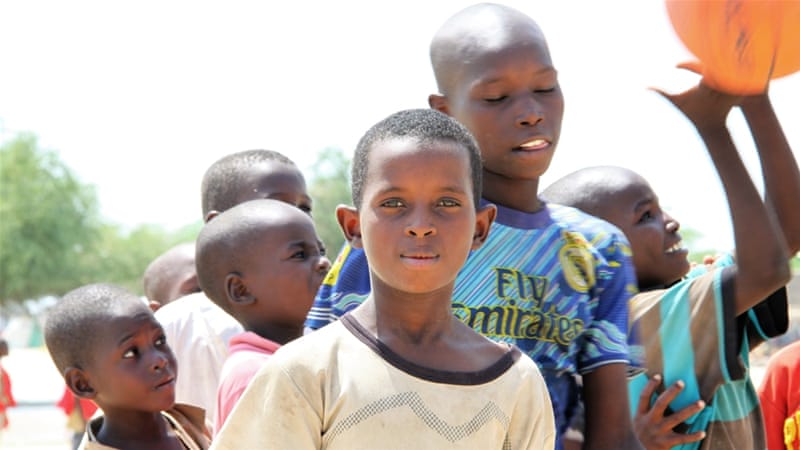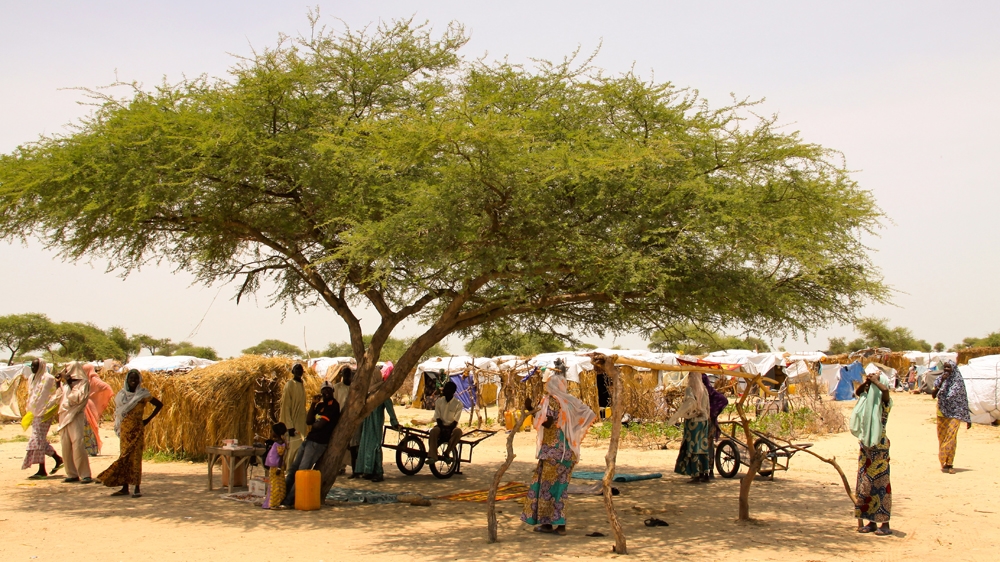Life On The Road
"I was there when my husband was killed."
"We told them [Boko Haram] we would give them whatever they wanted. They didn't want anything."
"They wanted his life."
"This [tent camp beside Niger's National Route 1] is not like a village. It's just an empty space."
Kiari Yamangou, widow, Niger
"We can sleep now. Because no one is shooting."
Fati Fougou, 40, mother of seven, Niger
"If we live by the road, people will pass by."
"If anyone wants to give us something, they'll know we're here, at this first spot."
Hadiza Mani, 60, widow, Niger
"They come in the afternoon. They come all night."
"It's so hard. Many people come with so many children. But I'm obliged to give them something to eat."
Shettima Fougou, village chief, Garin Wanzam, Niger
![Boko Haram refugees in Niger find safety, but lack aid More than 150,000 children found safety in Diffa after they were uprooted from their homes, but they lack education as schools are closed [Lucas Destrijcker/ Al Jazeera]](http://www.aljazeera.com/mritems/imagecache/mbdmegaxxlarge/mritems/Images/2016/9/22/f79933d465d54e9fa9e3737f3e198503_9.jpg) |
| Lucas Destrijcker, Al Jazeera |
In desperation, they flee Nigeria to enter Niger, hoping to place distance between themselves and the terror that Boko Harm has brought to their country. Over 130,000 desperate refugees have found an improbable home away from home, beside a highway cut straight through the Niger desert. It is a highway that was left unfinished. But to the desperate, the desolate sandy area is their new home, where they imagine themselves to be safe, finally, from the depredations of Boko Haram.
There are not any actual travellers on the highway, since it has a sudden end at nowhere, with the desert all around. A Chinese oil company planning to create a short cut from Niger to its oil fields close to the border with Chad, still has 130 kilometers to go to complete its journey. But construction stopped two years ago after ongoing attacks by Boko Haram. The Chinese are no longer to be seen; in their place are tens of thousands of Nigerians living in huts comprised of grain stalks, fabric scraps, torn flour bags and tarps.
"Sometimes I think they'll come again, even here. I have nightmares -- they're coming to kill me, they're coming to kill me", said 13-year-old Atcha Mallam for whom the roadside has been home for the past year and a half. Boko Haram may have suffered lost battles diminishing their presence, persuading hundreds of thousands of Nigerians to return home to their villages, but there is nothing left of the villages to return to.

At least four million people have no access to aid, and an estimated 475,000 children across Lake Chad will suffer from severe acute malnutrition this year [Lucas Destrijcker/ Al Jazeera]
Over 200,000 people left homeless by the violence have found what they identify as safety in the Diffa region of Niger alongside the border with Nigeria, where National Route 1 was built. A paved highway in the middle of a desert. There are regular patrols by the Niger military along the paved stretch of highway, but thus far Boko Haram is nowhere to be seen, and the refugees living there feel a sense of security.
UNICEF trucks water into the highway community while the International Rescue Committee gives out bags of rice, tins of sardine, and powdered milk, and Doctors Without Borders run medical clinics. The refugees have transformed small roadside villages into refugee towns overwhelming the ground wells in an area of scarce water and where crops cannot endure brutal heat. Some of the refugees arrived with herds and flocks of cattle, goats, donkeys and chickens, all needing food and water.
Former fisherfolk and farmers were forced to leave their livelihoods. Away from the desert, a fertile area exists close to Lake Chad, but this is where Boko Haram has established itself, despite several nations' militaries having made major advances in destroying their territorial gains. The small village of Garin Wanzam where Shettima Fougou is chief, had 20 people twenty years ago, and now tries to provide food and shelter to 13,000 people.
By Oxfam International's estimates 80 percent of the displaced in the area around Diffa adjacent the highway are being fed and sheltered by local communities, communities even in peace that are considered to represent the continent's most indigent. Aid groups offer a number of activity centers in an attempt to alleviate boredom, since labour in the desert is a thin affair with few growing fields. Markets sell wood, fabric, vegetables yet many people have no means of purchase.
 |
| More than 150,000 children found safety in Diffa after they were uprooted from their homes, but they lack education as schools are closed [Lucas Destrijcker/ Al Jazeera] |
 Displaced Nigerians seek some shade in Assaga
settlement. During the dry season, temperatures climb up to 48C [Lucas
Destrijcker/Al Jazeera]
Displaced Nigerians seek some shade in Assaga
settlement. During the dry season, temperatures climb up to 48C [Lucas
Destrijcker/Al Jazeera]Labels: Boko Haram, Crisis Management, Nigeria

<< Home